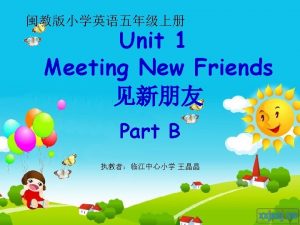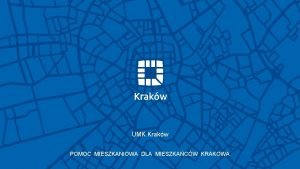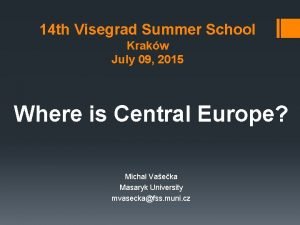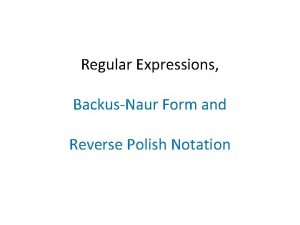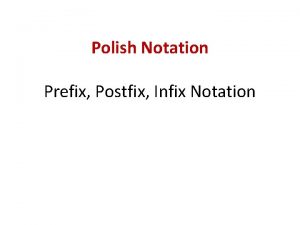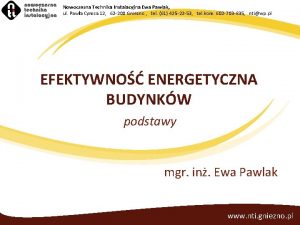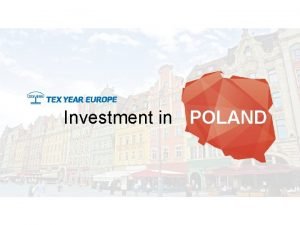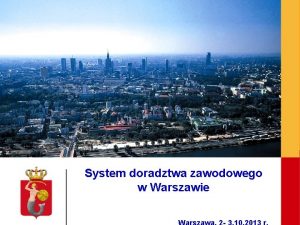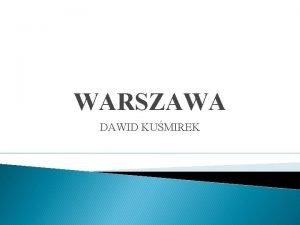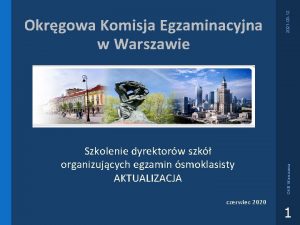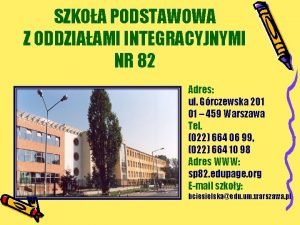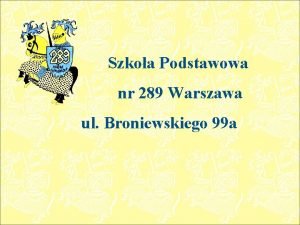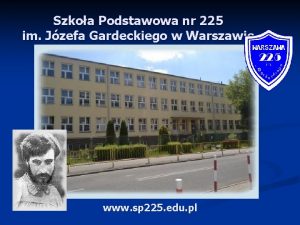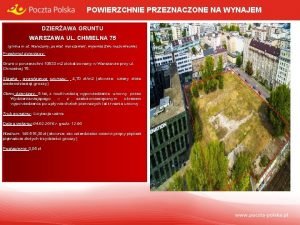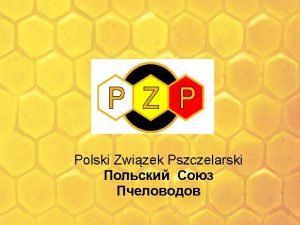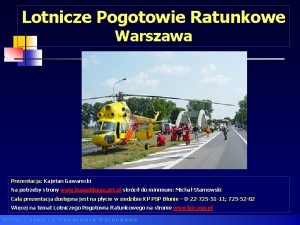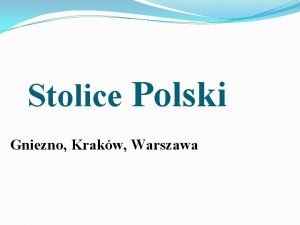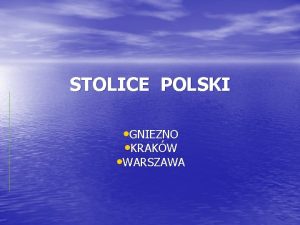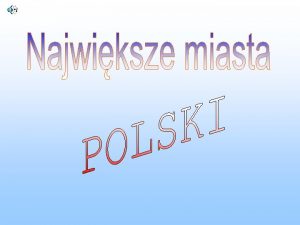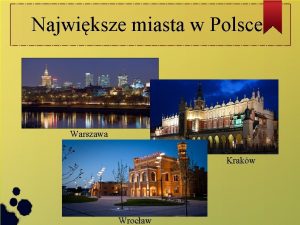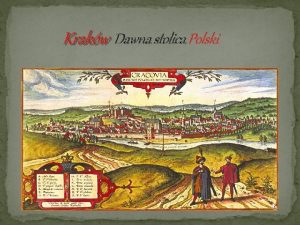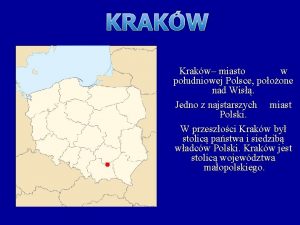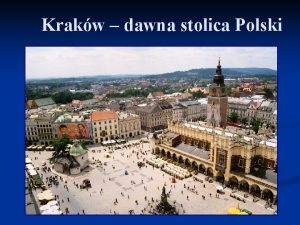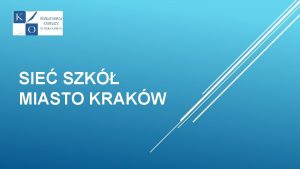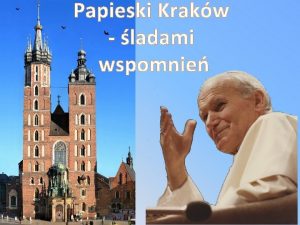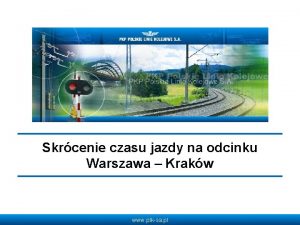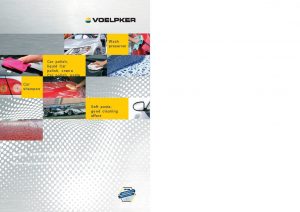Gniezno Krakw Short review of Polish History Warszawa
















- Slides: 16

Gniezno Kraków Short review of Polish History Warszawa

Lech Wałęsa Welcome, welcome everyone! My name is Lech Wałęsa. I'm the Peace Nobel Prize laureate and first president of Poland elected in free, democratic election in 1990. I'd like to take you for a trip in our history together with some significant characters from our past.

Mieszko I am Mieszko the first ruler of Poland a founder of the Piast Dynasty. And here is my wife Dobrawa I'm a Czech princess who brought Christianity to Poland. Christian priests baptized Mieszko and his retinue in 996 AD. Since then our country has been a christian one. . Bishop I baptize you in the name of the Father, the Son and the Holy Ghost. Amen

Lech Wałęsa And look, someone is coming. Mieszko This is my successor, my son Bolesław called Chrobry. Bishop Bolesław, I crown you to be the first king of Poland. Govern this country well and just. Bolesław Chrobry – the First King of Poland Kazimierz Wielki And I'm Kazimierz Wielki in my times first university was set up, wooden houses changed into brick ones and fortified castles were built. I really cared for my subjects and hey were well off. Unfortunately I didn't have a successor so the Piast dynasty became extinct.

Jadwiga My name is Jadwiga. I rule this country just like the present English Queen Elizabeth II does. I'm looking for a husband to help me. Władysław Jagiełło I'm coming from Lithuania, I’m the Great Lithuanian Prince. The Queen! Let's unite our countries in one big and strong country and defeat our mutual enemy-Teutonic Knights.

Jan Długosz The King leading the Polish Army arrives at the fields of Grunwald. The Lithuanians against the power of Teutonian Knights. The battle takes place on a hot July day, the Polish and Lithuanian knights win. 1410 – the Battle of Grunwald

Zygmund II August My name is Zygmund II August, I am the king of Poland the Great Prince if Lithuania. I have no successor who can take over the throne. That is why I propose Poland Lithuania to be joined by Union. Thanks to this a new , strong country will be established. 1385 – Polish-Lithuanian Union

Jan Długosz It is year 1791. The Parliament is sitting over the constitution, the first constitution in Europe, thanks to which Poland would become a Constitutional monarchy. The dangers are waiting. A tragic moment is coming. Katarzyna II We united to do the partition of Poland. Fryderyk II Each of us will get the bordering lands and will incorporate them into their country. Cesarzowa Austrii Poland disappears from the map of the world for 123 years!

Tadeusz Kościuszko We cannot accept this shameful fact. PATRIOTS!!! Take your arms and fight for the independence! Kosynier Many generations fought to get Polish land back, but the occupants supported one another and suppressed the rebellions.

Józef Wybicki Fighting by the side of Napoleon we looked for hope. Missing the free country the legionaries sang a song that become the national anthem of Poland. I World War broke out. The occupants fight with one another, we have to take advantage of that fact and regain independence. Legioniści Poland free! Poland independent!

The time came for restoration and integration of Polish lands had come. Unfortunately, we didn’t enjoy freedom and peace much. In September 1939 the Nazi invaded Polish land the II World War started. 1939 – Second World War

Warsaw Rebel Polish youth joined the battle with occupant. Warsaw Uprising broke up. Despite the enormous devotion and sacrifice made by Warsaw people, the Uprising was bloody put down. Warsaw was entirely devastated. Despite the terror and inhumanity of the invader, who built concentration camps on our grounds, we didn’t give up. Polish fought on all of the fronts during the II World War: Polish aviators in battles of England, Polish soldiers in battles of Monte Cassino, Arnhem, Dunkierka. We even reached Berlin together with allied army.

Lech Wałęsa After the War Poland was under the influence of Soviet Union, it wasn’t a fully sovereign country. The Polish wanted to be independent. It was the time when „Solidarność” was created and started to fight for democratic latitude. We secure the victory in 1989 after the „Round table” debates. And …Poland entered the democratic. Transformation. Ali this time Polish Church and Pope John Paul II, who had been elected to the Saint Peter’s capital in 1978, were both a great support. /recording of Pope’s first Speech after the konklawe/ Lech Wałęsa Poland started to develop rapidly and integrate with Western Europe. All of this led to joining the European Union on 1 st of May 2004. /everyone sings „Oda do Radości”/

Every year we organize „Competition of the patriotic poetry” to memorize not only our national heroes but also all people for whom fighting for our country was a great honor.

Creating a curriculum we try: -to help children in the early years understand the world in which they live by presenting dramas and historical stories - to make lessons more exciting and memorable by going on school trips - to learn about architecture by visiting historical places - to encourage children to think of our roots by doing different competitions Competences • Communication in the mother tongue • Communication in foreign languages • Learning to learn • Social and civic competences • Sense of initiative and entrepreneurship • Cultural awareness and expression

The End
 Short short short long long long short short short
Short short short long long long short short short Gmk umk
Gmk umk Krakw
Krakw Regex polish letters
Regex polish letters Reverse polish notation
Reverse polish notation Pomiary skuteczności wentylacji mechanicznych gniezno
Pomiary skuteczności wentylacji mechanicznych gniezno Tex year gniezno
Tex year gniezno Prirytety bura edukacji warszawa
Prirytety bura edukacji warszawa Julian tuwim
Julian tuwim Sioeo - egzamin ósmoklasisty 2022 instrukcja
Sioeo - egzamin ósmoklasisty 2022 instrukcja Szkoła podstawowa górczewska 201
Szkoła podstawowa górczewska 201 Szkoła podstawowa 289
Szkoła podstawowa 289 Sp 225 warszawa
Sp 225 warszawa Wynajem gruntu warszawa
Wynajem gruntu warszawa Technikum pszczelarskie warszawa
Technikum pszczelarskie warszawa Novotel warszawa kontakt
Novotel warszawa kontakt Kppspblonie
Kppspblonie
